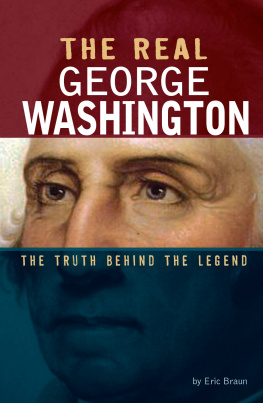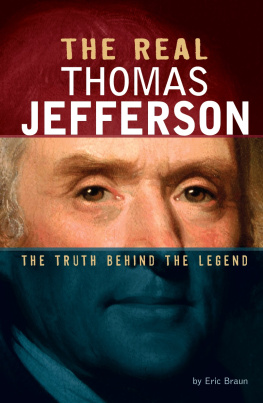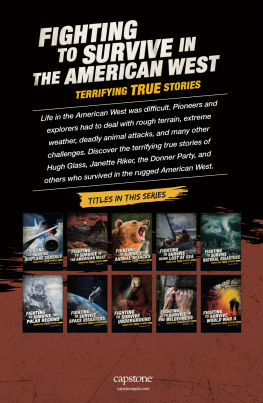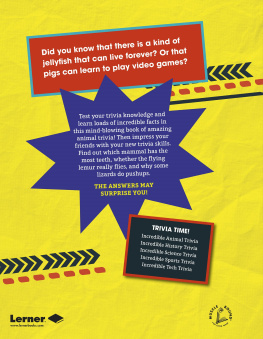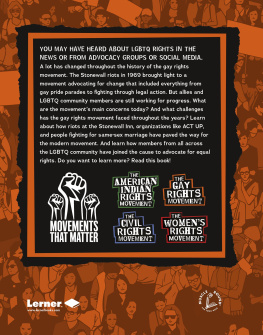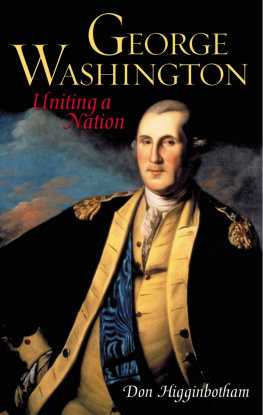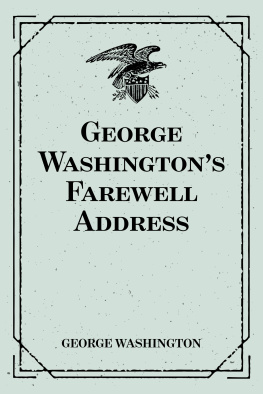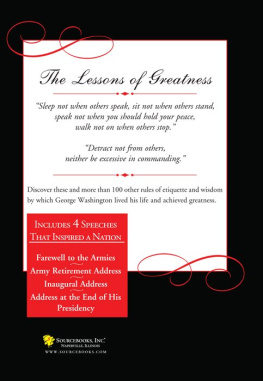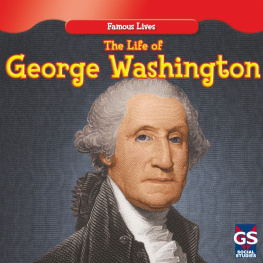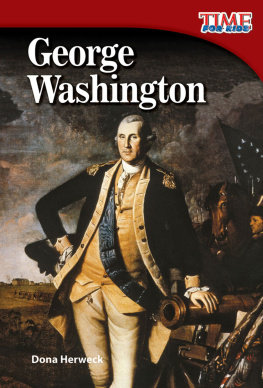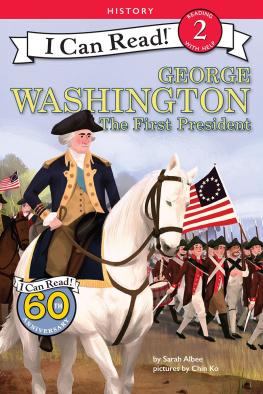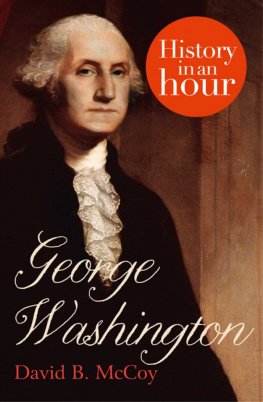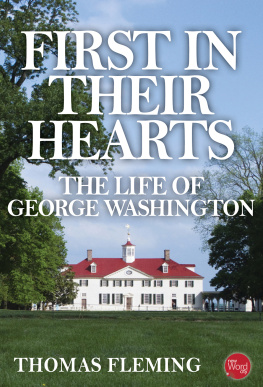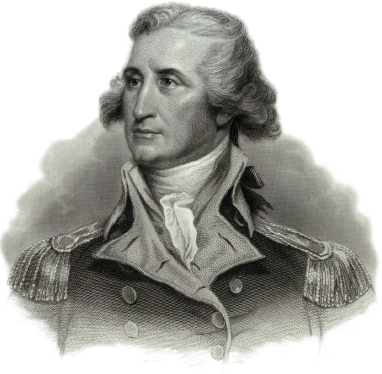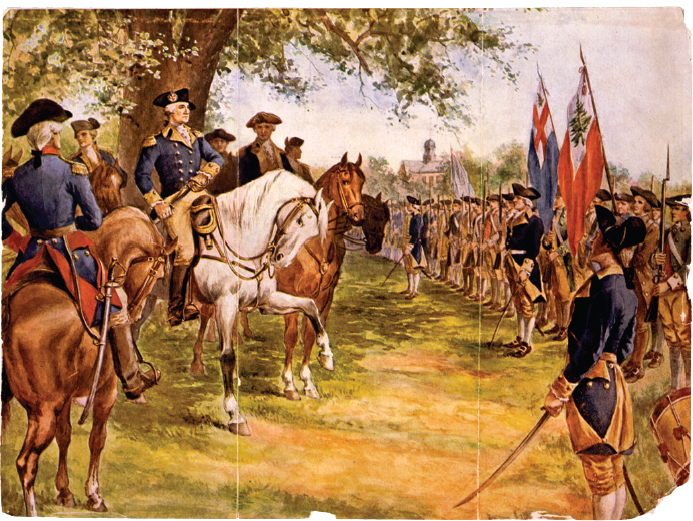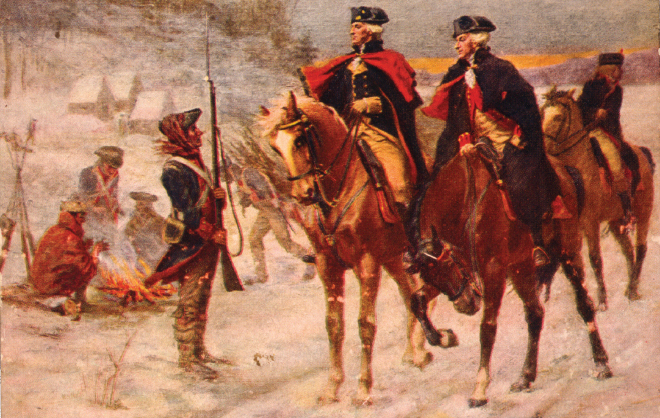CHAPTER ONE
A MONUMENTAL LEADER
George Washington did so much to help establish the United States of America, he isknown as the father of our country. He risked his life, served in many roles, sacrificedagain and again, and led with honor. Even his political enemies admired him. Itsdifficult to boil down a list of his most important accomplishments, but it wouldhave to begin with his military command.
COMMANDER OF THE FIRST CONTINENTAL ARMY
A fist fight in Boston started because troops from Massachusetts teased soldiersfrom Virginia. They said the Virginia soldiers had silly uniforms. They even threwsnowballs at the southerners. The Virginians yelled back. Soon, a huge fight brokeout. Thats when General George Washington showed up.
Washington had come to Boston to take the job of leading the newly created faced was hard enough. The British hadmany advantages. And now more than 1,000 of his own men were brawling. How couldthey expect to defeat the enemy if they couldnt even get along together?
But if Washington lost any hope at that moment, he did not show it. Instead, he rodehis horse right into the middle of the fight. All around him, men were punching,kicking, wrestling, and shouting. He leaped from his saddle and grabbed two of thetallest, strongest men by the neck. He shook them. When the other men saw their angrygeneral, they scattered. They didnt fight again. Washington had broken up the fightbefore it led to serious consequences for both sides.
This moment was an example of Washingtons strength and leadership. It showed therespect his men had for him. He was exactly the leader that the rebels needed. Buthe never wanted the job.
In the summer of 1775, George Washington was a wealthy landowner. He was a planterand part-time legislator in the American colony of Virginia. Twenty years earlier,he had been a leader in the French and Indian War (17541763). He fought for theBritish against the French in the unsettled lands west of Virginia. He gained a namefor himself as a leader with great courage and honor. Then, in 1759, he married thewealthy widow Martha Custis. He left the military. He and Martha settled into lifetogether at his estate at Mount Vernon. Over the next decades, he bought nearly 8,000acres (3237 hectares) of prime farmland. He farmed tobacco and other crops.
But Washington and other colonial farmers and businessmen were frustrated. They resentedthe taxes and other forms of British interference. They formed a Continental Congressto address their issues with Britain. Washington joined as a Virginia delegate.
Tensions with the British were growing. By the late 1760s, British and colonial troopsin Massachusetts were fighting over taxes and other issues. In 1775, the ContinentalCongress decided to create a Continental Army. The goal was to gather troops fromacross the colonies. Members of the Congress selected Washington to lead the brandnew army.
The appointment was a great honor for Washington. But he felt unprepared. His last military service had been nearly 20 years earlier. In a letter to his wife, Washingtondescribed his feelings about his new responsibilities. It fills me with inexpressible concern, he wrote. Rather than seeking out the job, he had used every endeavor in my power to avoid it. But, he added, refusing to take the challenge would havereflected dishonor upon myself.
Washington took command of the Continental Army in 1775. He faced a difficult taskin fighting well-trained British forces.
So in early July 1775, Washington arrived in Boston. He was ready to lead the newlycreated Continental Army. It was a nearly impossible task. The British troops werehighly trained. They had money from Britain. The Continental Army was made up ofsoldiers from the 13 colonies, which had joined to declare their independence. Mostwere part-time soldiers. Very few had any serious or prolonged training. Many hadpoor-quality weapons. Some had none.
The Continental Army had another problem. The soldiers were not united. They feltloyal to their own colonies but not to the larger Continental Army. That was whatled the Massachusetts and Virginia soldiers to fight each other. Ultimately, Washingtonwas able to unite the in their common cause.
WASHINGTONS STUNNING VICTORIES
Washingtons goal as commander of the Continental Army was to drive the British fromthe colonies. But his army was short on money, supplies, and trained soldiers. Tomake things worse, Washingtons troops faced one of the worlds mightiest militaries.The British Army and Navy were world powers.
But from the beginning, Washington showed that he could outsmart his enemies. Hisfirst goal was to force British troops out of the city of Boston. The British hadoccupied it since they won the Battle of Bunker Hill early in the war. Washingtonknew his untrained troops couldnt drive the British out of Boston. But he linedup heavy artillery outside the city and bombarded it for two days. Then he orderedthe guns moved to a higher position in Dorchester Heights, which also overlookedthe harbor where the British had ships. The British knew they could not withstandbombardment from those guns at that elevated position. They retreated from Bostonon March 17, 1776.
Later, the Continental Army suffered several stinging defeats. Five months afterthey retreated from Boston, British forces defeated Washingtons army in the Battleof Long Island in New York. In the following months, the British drove the revolutionarytroops south through New Jersey. In the middle of December, Washington retreatedwith his army south across the Delaware River. They camped on the Pennsylvania sideof the river. The winter was bitterly cold. They had very little food, ammunition,or supplies.
Washington and Marquis de Lafayette oversaw troops during a difficult winter at theValley Forge encampment. A lack of food and supplies there left men vulnerable tolife-threatening illnesses.
Washington knew he needed to act to turn the tide. He planned a surprise attack onthe British forces across the river in Trenton, New Jersey. (Actually, the soldiersin Trenton were Hessians, or Germans, who were fighting for the British.) He wouldcross the river with his 2,400 men. Two of his generals would meet him at Trentonwith another 2,600 soldiers. Washington expected to succeed behind the might of 5,000men.
On Christmas Day, he crossed the icy river with his troops. Then they marched 19miles (31 kilometers) through an ice storm to reach Trenton. Right away a problemarose for Washington. The other two generals and their men hadnt reached Trenton.Washington and his soldiers had to face a larger army on their own.
But the Hessians at Trenton were not prepared for Washingtons surprise attack. Washingtonfired cannons on the enemy camp. He split up his troops and had them attack fromtwo sides. The Hessian commander was shot and killed. Before long the Hessians surrendered.In the end, Washingtons troops killed 22 enemies. They also wounded 92, and captured918 Hessians. Washington lost only two soldiers. (They both froze to death.)
Little more than a week later, he led his men to an even larger surprise victoryat the Battle of Princeton in New Jersey. British General Charles Cornwallis hadbeen advancing on Washington with a huge army. Washington convinced men from localmilitias to join the Continental Army for the big battle. To trick Cornwallis, Washingtonleft campfires burning in camp while he and about 5,000 men sneaked away under coverof night. When Cornwallis attacked the camp in the morning, he found it nearly abandoned.Meanwhile, Washington and his men were fighting at Princeton. Washington himselfrode through gunfire, leading by example. Soon the Continentals won Princeton, takingmany prisoners and supplies. Washington had established himself as a first-rate commander.

